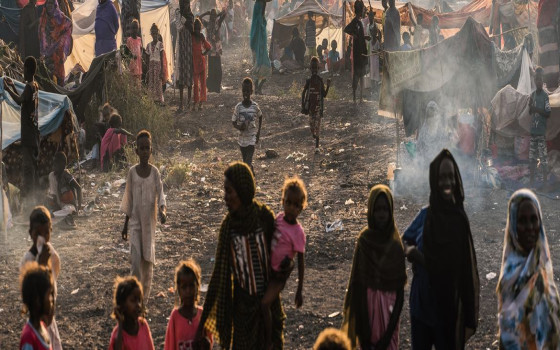
Thousands missing in Sudan after two years of war... UN warns of humanitarian repercussions in Darfur amid escalating violence and displacement of thousands of civilians

- Europe and Arabs
- Thursday , 10 April 2025 7:50 AM GMT
Khartoum - New York: Europe and the Arabs
On the second anniversary of the devastating war in Sudan, concerns are mounting about the fate of thousands of people who have disappeared amid the ongoing conflict. In an interview with UN News, Mr. Radhouane Nouicer, the UN expert on Sudan, examines this horrific issue.
Nouicer, appointed by the UN High Commissioner for Human Rights, explained that accurate statistics on the number of missing persons are still unavailable, noting discrepancies between different sources. While the Sudanese Group for Defending Rights and Freedoms estimates the number at around 50,000, Nouicer said, local Sudanese human rights organizations have documented at least 3,177 cases, including more than 500 women and 300 children. The UN expert emphasized that enforced disappearances and missing persons are a problem in Sudan, adding that these are not the only violations resulting from the "incomprehensible and unnecessary" war since April 2023. According to a UN news bulletin we received Thursday morning, other violations included the destruction of residential areas, rights violations, the expulsion of civilians from their homes, sexual assault, and the forced recruitment of young men from both sides of the conflict.
Human rights are not a priority for the parties.
Despite the UN's repeated calls for urgent international action to address the crisis of missing persons and achieve justice and redress for victims, Mr. Nouicer expressed his regret at the lack of attention paid by the parties concerned to human rights issues.
He continued, "Unfortunately, based on experience, the parties concerned do not attach much importance to human rights issues. There have been repeated calls by the United Nations, all its organizations, by the International Committee of the Red Cross, and by the UN Secretary-General himself to protect civilians and prevent their involvement in this conflict, but unfortunately, these calls and these actions have yielded no significant results." Regarding the challenges facing the documentation of enforced disappearances, Mr. Nouicer drew attention to communication problems, the security situation in conflict zones, families' reluctance to report cases, and the weakness of judicial and security services. He explained that most of the recorded cases are concentrated in conflict zones such as Khartoum, Sennar, El Fasher, White Nile, and Darfur states.
Civilians Pay a Heavy Price
Regarding the role of international and human rights organizations in supporting efforts to search for missing persons and provide support to their families, the UN expert noted the availability of psychosocial support and repeated calls for families to provide available information.
He added that the United Nations is trying to provide legal assistance to families to file complaints and demand investigations, but he reiterated that human rights issues do not appear to be a priority for the parties to the conflict.
In concluding his remarks, Mr. Nouicer delivered a strong message to the parties to the conflict, calling for the "protection of civilians," emphasizing that "Sudanese civilians are the ones who have paid the price for this senseless and unjustified war." He emphasized that thousands of families have been forced to flee and be displaced in search of safety. In the same context, and according to the UN daily news bulletin, the United Nations warned of the consequences of continuing hostilities across Darfur, Sudan, which have forced thousands of people to flee their homes amid deteriorating humanitarian conditions and restricted relief efforts.
UN spokesman Stéphane Dujarric said that more than 4,000 people were newly displaced in North Darfur state in the past week alone due to escalating violence in El Fasher, including in the Zamzam camp for displaced persons, where a famine has been confirmed.
During his daily press conference, Dujarric said: "Displaced families, including many women and children, are in dire need of shelter. They need food, water, and medical supplies, but severe funding gaps and logistical challenges are hampering aid organizations' ability to respond. A partner in the Zamzam camp told our colleagues that rising costs and fuel shortages have forced the suspension of water trucking for newly displaced people there." Since April 2023, more than 400,000 men, women, and children have been displaced within or outside El Fasher locality, when these latest rounds of hostilities began.
Dujarric stressed that the ongoing conflict continues to put civilians at risk across Sudan. He said that intensified fighting in Khartoum state has disrupted a period of calm in the western neighborhoods of Omdurman, adding that there are also reports of new civilian displacement, who urgently need protection and humanitarian assistance.
He noted that a drone attack in northern Sudan earlier this week led to the suspension of operations at the Merowe Dam, "causing widespread power outages in several states."
He said that the strikes reportedly caused civilian casualties and damaged critical infrastructure, "underscoring the increasing impact of this conflict on basic services."
The UN spokesperson reiterated his call for an immediate cessation of hostilities and unhindered humanitarian access throughout Sudan. He also urged donors to increase funding "to maintain life-saving services and help agencies reach those in need in areas affected by violence and acute hunger."












No Comments Found